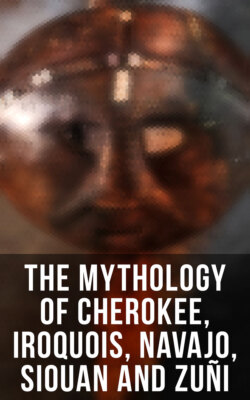Читать книгу The Mythology of Cherokee, Iroquois, Navajo, Siouan and Zuñi - James Mooney - Страница 241
На сайте Литреса книга снята с продажи.
The Resuscitation of the Bear-Man
ОглавлениеThe sun was shining but fitfully that day, however. Long intervals of gloom succeeded each gleam of sunlight. But the two bears set about collecting the remains of the Bear-man, who was indeed sadly mutilated, and, lying down on his body, they worked over him with their magic medicine till he showed signs of returning life. At length he fully regained consciousness, and, finding himself in the presence of two bears, was at a loss to know what had happened to him. But the animals related how they had brought him to life, and the sight of his dead comrades lying around him recalled what had gone before. Gratefully acknowledging the service the bears had done him, he accompanied them to their den. He was still very weak, and frequently fainted, but ere long he recovered his strength and was as well as ever, only he had no hair on his head, for the Sioux had scalped him. During his sojourn with the bears he was taught all the things that they knew—which was a great deal, for all Indians know that the bear is one of the wisest of animals. However, his host begged him not to regard the wonderful things he did as the outcome of his own strength, but to give thanks to Tiráwa, who had made the bears and had given them their wisdom and greatness. Finally he told the Bear-man to return to his people, where he would become a very great man, great in war and in wealth. But at the same time he must not forget the bears, nor cease to imitate them, for on that would depend much of his success.
"I shall look after you," he concluded. "If I die, you shall die; if I grow old, you shall grow old along with me. This tree"—pointing to a cedar—"shall be a protector to you. It never becomes old; it is always fresh and beautiful, the gift of Tiráwa. And if a thunderstorm should come while you are at home throw some cedar-wood on the fire and you will be safe."
Giving him a bear-skin cap to hide his hairless scalp, the Bear then bade him depart.
Arrived at his home, the young man was greeted with amazement, for it was thought that he had perished with the rest of the war party. But when he convinced his parents that it was indeed their son who visited them, they received him joyfully. When he had embraced his friends and had been congratulated by them on his return, he told them of the bears, who were waiting outside the village. Taking presents of Indian tobacco, sweet-smelling clay, buffalo-meat, and beads, he returned to them, and again talked with the he-bear. The latter hugged him, saying: "As my fur has touched you, you will be great; as my hands have touched your hands, you will be fearless; and as my mouth touches your mouth, you will be wise." With that the bears departed.
True to his words, the animal made the Bear-man the greatest warrior of his tribe. He was the originator of the Bear Dance, which the Pawnees still practise. He lived to an advanced age, greatly honoured by his people.
